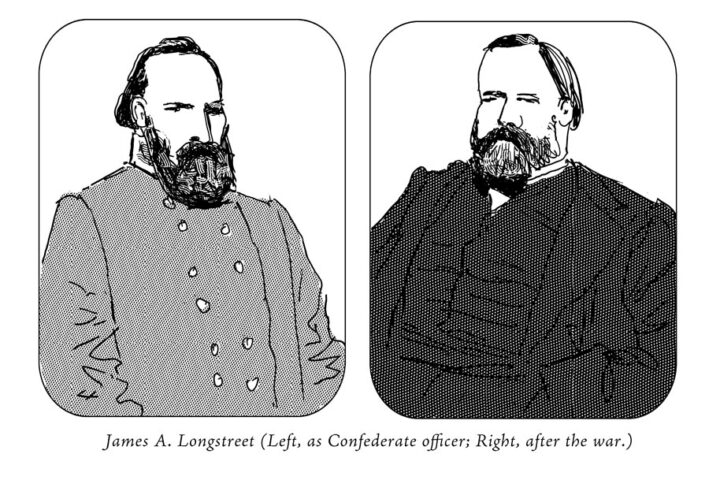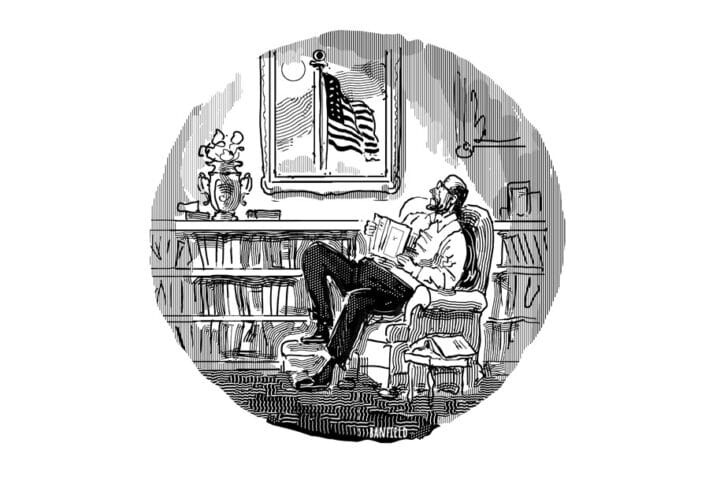Books Reviewed
On the deck of a captured cruise ship, in front of almost 200 other hostages, the Muslim terrorists took the ten-month-old child from its young French mother’s arms, disemboweled the infant with a curved knife, and threw the dead body overboard. They then ceremoniously decapitated the kneeling mother and threw her overboard in two parts. This was just the beginning of the slaughter, torture, ritual rapings, and casual executions.
These events are not recorded in newspapers and newscasts of the past few months but in Mark Helprin’s latest novel, The Oceans and the Stars, which came out officially just four days before the horrors of last October 7.
On its title page it is given the subtitle The Seven Battles and Mutiny of Athena, Patrol Coastal Ship 15, but on its cover The Oceans and the Stars is said to be A Sea Story, A War Story, A Love Story. Helprin is a seasoned master of all three. The book is dedicated to the United States Navy and does great honor to the Navy, to Navy traditions, and to the traditions of the country the Navy serves. The epigraph, from Psalm 107, sets the high epic tone that is characteristic of Helprin’s fiction: “They that go down to the sea in ships, and occupy their business in great waters; These men see the works of the Lord, and his wonders in the deep.”
At “0700 on 21 January,” a court martial is convened at Naval Station Norfolk, the largest naval complex in the world, located in the southeastern corner of the Commonwealth of Virginia, in the area known by locals as Hampton Roads. This is where, when, and how the story begins. The defendant is Stephen Rensselaer, Captain, United States Navy, who is charged with two capital crimes among others and, despite his recent life-threatening wounds and surgeries, sits straight and strong facing his capital verdict with more equanimity than the assembled admirals who would hand it down. A presidential inauguration had taken place the day before, and as the story unfolds we can infer, though it is never stated, that this is January 2021. We don’t know why this court martial is taking place, what the specific charges are, who exactly Captain Stephen Rensselaer is, how he got his wounds, who was elected president, or why that matters.
***
We learn—in the next few hundred pages, in the elevating tempo of Helprin’s prose, a tempo ennobling mortal men and all their strivings with the sacred radiance of eternity—Stephen Rensselaer is captain of the Athena, Patrol Coastal Ship 15, which was just recently “fitted out in the Bollinger Algiers yards across from downtown New Orleans.” She is smaller than a frigate, bigger than a standard Patrol Coastal (PC), unprecedentedly fast, and very heavily armed. She is one of a kind and, like her namesake, “the first and last of her class.” She, her captain, and her crew of a few officers and a couple of dozen men are the heroes of the book.
On a May afternoon, Rensselaer called the woman he loved at her law office and asked her to meet him at the familiar bench on a quiet street near downtown New Orleans where they often met for lunch. She went by the name Katy, but her given name was Penelope, and like Homer’s Penelope, she had many suitors. “Can it wait until evening?” “It can’t.” When she joined him at the bench, he told her that she would soon see on the news that Iranian shore-based anti-ship missiles had sunk a tanker and two American PCs in the Strait of Hormuz. Swarms of Iranian speedboats machine-gunned the more than 50 survivors in the water. American aircraft from the Al-Udeid base in Qatar and from the aircraft carrier Vinson attacked Iranian coastal bases. The entire fifth fleet was in the Persian Gulf. Ships were “pouring out of Hampton Roads, San Diego, Hawaii, Japan, and Guam,” heading for the Arabian Sea. He had gotten the call at the yard and must leave. Now. He asks her to marry him. She says yes. And he is off to war, across the sea—to seven battles, a mutiny, great heroism, severe wounds…and a court martial.
***
In the world of Helprin’s novels, as in our world, there will be war, those who are its victims, those made for waging it, and loved ones who must be left behind, maybe never to be seen again. And the two greatest realities in this world are good and evil. As Captain Rensselaer tells his men before one of their final battles, “Whether in the next hours you live or die, know this: even if known but to God, to do what is right will be permanently engraved on the walls of time.”
In the past few years, Helprin’s readers have seen every branch of the American military replace its mission of defending America with the mission of enacting racist quotas and forcing transsexuality upon the world. At the same time, we have seen America itself replace its glorious dedication to the American proposition with imperial promotion of racist quotas and transsexual abominations. The thoughts unavoidably arise: Do Helprin and his hero honor the Navy and America more than they deserve? Can such a degraded institution and such a degraded country be worthy of the last measure of devotion? Rensselaer faced this grave dilemma standing on the bridge of his very first command and wondering whether what he was doing was right. An answer came to him literally in a flash. As he told Katy: “We have become a civilization that elevates idiots, prostitutes, and clowns. Am I still to defend it? Yes, for its principles. Yes, for what it was. Yes, for what it still may be.”





